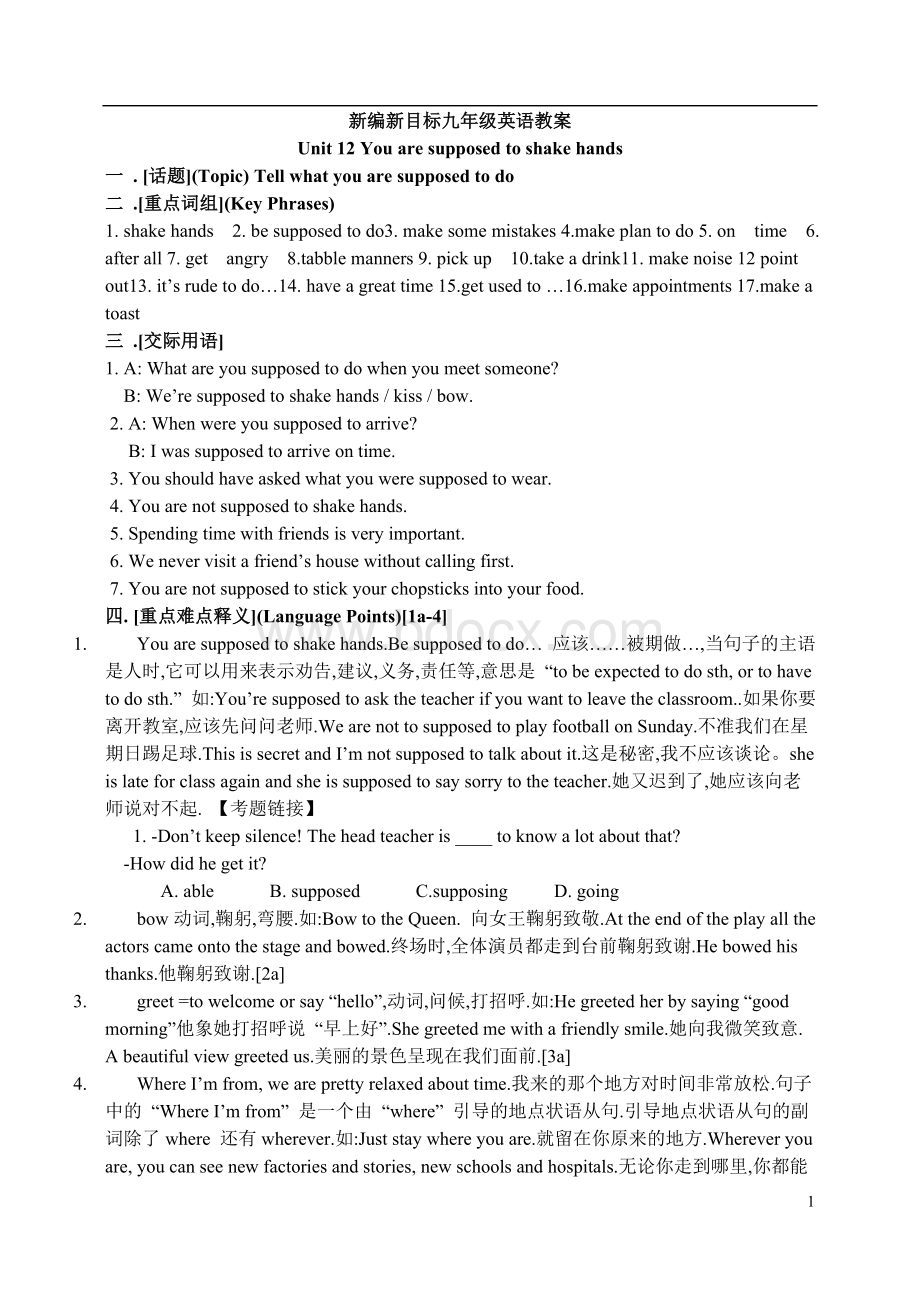新编九年级新目标英语教案Unit12.doc
《新编九年级新目标英语教案Unit12.doc》由会员分享,可在线阅读,更多相关《新编九年级新目标英语教案Unit12.doc(10页珍藏版)》请在冰豆网上搜索。

新编新目标九年级英语教案
Unit12Youaresupposedtoshakehands
一.[话题](Topic)Tellwhatyouaresupposedtodo
二.[重点词组](KeyPhrases)
1.shakehands2.besupposedtodo3.makesomemistakes4.makeplantodo5.ontime6.afterall7.getangry8.tabblemanners9.pickup10.takeadrink11.makenoise12pointout13.it’srudetodo…14.haveagreattime15.getusedto…16.makeappointments17.makeatoast
三.[交际用语]
1.A:
Whatareyousupposedtodowhenyoumeetsomeone?
B:
We’resupposedtoshakehands/kiss/bow.
2.A:
Whenwereyousupposedtoarrive?
B:
Iwassupposedtoarriveontime.
3.Youshouldhaveaskedwhatyouweresupposedtowear.
4.Youarenotsupposedtoshakehands.
5.Spendingtimewithfriendsisveryimportant.
6.Wenevervisitafriend’shousewithoutcallingfirst.
7.Youarenotsupposedtostickyourchopsticksintoyourfood.
四.[重点难点释义](LanguagePoints)[1a-4]
1.Youaresupposedtoshakehands.Besupposedtodo…应该……被期做…,当句子的主语是人时,它可以用来表示劝告,建议,义务,责任等,意思是“tobeexpectedtodosth,ortohavetodosth.”如:
You’resupposedtoasktheteacherifyouwanttoleavetheclassroom..如果你要离开教室,应该先问问老师.WearenottosupposedtoplayfootballonSunday.不准我们在星期日踢足球.ThisissecretandI’mnotsupposedtotalkaboutit.这是秘密,我不应该谈论。
sheislateforclassagainandsheissupposedtosaysorrytotheteacher.她又迟到了,她应该向老师说对不起.【考题链接】
1.-Don’tkeepsilence!
Theheadteacheris____toknowalotaboutthat?
-Howdidhegetit?
A.ableB.supposedC.supposingD.going
2.bow动词,鞠躬,弯腰.如:
BowtotheQueen.向女王鞠躬致敬.Attheendoftheplayalltheactorscameontothestageandbowed.终场时,全体演员都走到台前鞠躬致谢.Hebowedhisthanks.他鞠躬致谢.[2a]
3.greet=towelcomeorsay“hello”,动词,问候,打招呼.如:
Hegreetedherbysaying“goodmorning”他象她打招呼说“早上好”.Shegreetedmewithafriendlysmile.她向我微笑致意.Abeautifulviewgreetedus.美丽的景色呈现在我们面前.[3a]
4.WhereI’mfrom,weareprettyrelaxedabouttime.我来的那个地方对时间非常放松.句子中的“WhereI’mfrom”是一个由“where”引导的地点状语从句.引导地点状语从句的副词除了where还有wherever.如:
Juststaywhereyouare.就留在你原来的地方.Whereveryouare,youcanseenewfactoriesandstories,newschoolsandhospitals.无论你走到哪里,你都能见到新建的工厂,商店,学校和医院.
5.Wearethelandofwatches,afterall!
毕竟我们是手表王国.
(1)句中的land是一个名词,“国家”“国土”的意思.如:
Afterlivinginforeignlandsformanyyears,themanwentbackhome.在外国居住了多年之后,这个人回到了自己的祖国.Land还可以表示“陆地”“土壤”“土地”等意思.如Wetraveledbylanduntilwereachedthesea.我们在陆路旅行,一直到大海.
(2)句子中的词组“afterall’’意思是“毕竟”.如:
soyousee,Iwasrightafterall.你看,毕竟还是我对吧.Youdecidedtocomeafterall.你毕竟还是决定来了.SectionB
6.Inchina,you’renotsupposedtopickupyourbowlofrice.在中国,你不应该端起你的饭碗.Pickup,“捡起;拾起;拿起”.如:
Agirlpickedupawalletonherwayhome.一个小女孩在回家的路上捡到了一个钱包.ThephonestoppedringingjustasIpickedupthereceiver.我一拿起听筒,电话就不响了.Pickthosethingsupoffthefloor!
捡起地板上的东西.【考题链接】
.2.-Whowasthewinner?
-Jackwas.Andhewas____totakepartinthenationalsportsmeeeting.
A.gotB.hadC.pickedD.taken
3.-Whatareyougoingnow?
-Ihaveto_____mykidsfromschool.
A.pickupB.takecareofC.takeawayD.makeup
7.InBrazil,youshouldwipeyourmouthwithyournapkineverytimeyoutakeadrink.在巴西,每次喝完东西后你应该用餐巾纸擦嘴.Wipe动词,意思是“擦,擦去.”常与away,off,up连用,表示“擦干净’’.如:
Wipethedirtoffyourshoes.抹去鞋上的污泥.Wipeupthemilkyouspilled,please.请抹掉洒出来的牛奶.
8.tostickyourchopsticksintoyourfood.把筷子插入你的食物中.
(1)stick动词,“刺,插入”如:
Stickaforkintothemeattoseeifit’sready.将叉插进肉里看熟了没有.Ican’tmove.There’sapieceofwirestickinginmyleg.我动不了啦,有一根金属丝刺进我的腿里了.
(2)chopstick是由“chop(砍)+stick(棍子)组成的合成词.意思是“筷子”它通常以复数形式出现.如:
OurChinesealwaysusechopsticktoeat,buttheEnglishdon’tusethem.我们中国人通常用筷子吃饭,而英国人不.一双筷子是apairofchopsticks.
9.It’srudetopointatanyonewithyourchopsticks.用你的筷子指着别人是很不礼貌的.
(1)rude形容词,粗鲁的;无理的.常用词组berudetosb,意思是“对某人无理”如:
It’srudetointerruptwhenpeoplearespeaking.打断人家的话是不礼貌的.Ithinkitwasrudeofthemnottophoneandsaythattheyweren’tcoming.他们来不了,也不打电话通知一声,太不象话了.
(2)point是一个动词,意思是“指,指向”.它构成的词组”“pointat”意思是“指向”“对准”.如:
“I’llhavethatone.”Shesaid,pointingatabigchocolatecake.“我想要这个.”她指着一块大的巧克力蛋糕说.[3a]
10.tablemanners餐桌礼仪.manner是“礼貌”的意思,常以复数形式出现.如:
It’sbadmannertotalkwithafullmouth.嘴里吃着东西说话是不礼貌的.Manner还可以表示“风俗;习惯”时,也常以复数形式出现.如.ThemanneroftheancientEgyptians古埃及的风俗习惯.Manner还可以表示“方法;方式”“态度;举止”等意思.如:
Don’tyouthinkthatDavidhasgotaveryarrogantmanner?
你难道不觉得戴维的态度很傲慢吗?
Whyareyoutalkinginsuchastrangemanner?
你为什么用这种奇怪的方式谈话.
11.Mybiggestchallengeislearninghowtobehaveatthedinnertable.我最大的挑战是学会餐桌上的礼仪.Behave动词,意思是“行为举止;举止”如:
Theboybehavedverywelllastnight.孩子昨天晚上表现挺好.Theteacherencouragedthechildrentobehavewellandnottobeadiscredittothecollective.老师鼓励孩子们表现得好一些,不要给集体丢脸.Thelittleboybehavedwithgreatencourageinthefaceofgunman.在持枪歹徒面前,这个小男孩表现得极有勇气.它